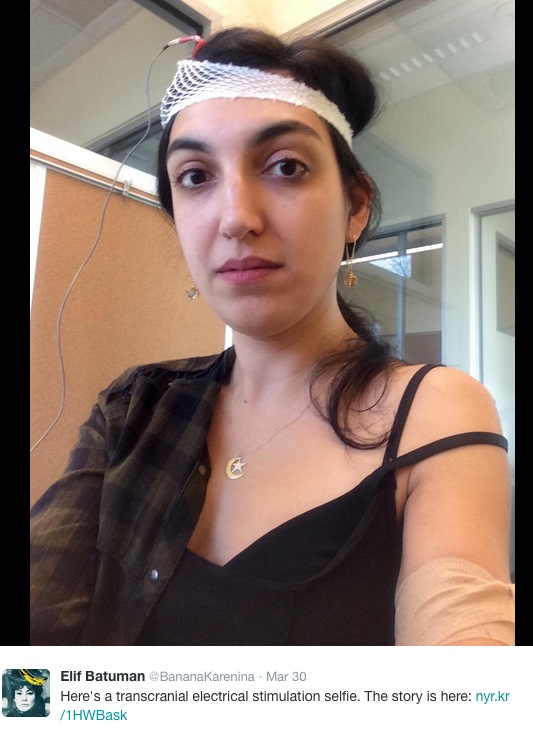Adventures in Transcranial Direct-Current Stimulation author Elif Batuman
Excellent! We met Jim Fugedy in podcast episode #2
It is the rare human who doesn’t wish to change something about his or her brain. In my case, it’s depression, which runs on both sides of my family. I’ve been taking antidepressants for almost twenty years, and they help a lot. But every couple of years the effects wear off, and I have to either up the dose or switch to a different drug—neither process can be repeated indefinitely without the risk of liver or kidney damage. So although my symptoms are under control for now, I worry, depressively, about what will happen when I exhaust the meds. As I was researching this piece, my attention was caught by a number of randomized controlled trials showing a benefit from tDCS for depression. (The data are insufficient to allow definitive conclusions, but larger trials are in progress.) I was almost embarrassed by how excited I felt. What if it was possible to feel less sad—to escape the deterministic cycle of sadness? What if you could do the treatment yourself, at home, without the humiliation and expense of doctors’ visits? I asked Vince Clark whether any private physicians use tDCS outside of a research setting.
via Adventures in Transcranial Direct-Current Stimulation – The New Yorker.

Elif closes with a pondering of why tDCS seems to work in some cases paired with a task, in others not. FWIW I recall work [re: trauma, PTSD etc.] suggesting that memories are reformed when we recall them — i.e. sort of a “Save As” new rather than simply saving a document we’re working on. While we’re recalling a memory, actively changing it, or causing the memory not to be saved at all, can make it’s [perhaps nasty] effects apparently go away. Could this be somehow related to when tDCS works best?
It *seems* reasonable anyway that paired with a learning task, the new memory might be stronger, better, reinforced, while in the absence of that task, memories being recalled during tDCS might be re-written differently, or maybe not at all. If one is depressed during tDCS, & if part of that depression is remembering, then weakening those memories should help, should it not?
Great read BTW.
One theory that strikes me as plausible around why some and not others comes out of a Kadosh math study where subjects who were already near the top of their game showed little or no benefit from tDCS while others with lesser math skills showed significant benefits. If you’re already good at something perhaps tDCS can’t facilitate more neuronal activity. And yes, the notion of ‘neurons that fire together, wire together’ (in the context of learning or remembering) would definitely seem to be playing a role in tDCS benefits. I agree, a lot of *seems* reasonable when it comes to tDCS. Hopefully we’re very close to having a clearer understanding. Thanks for stopping by.